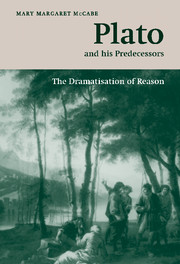4 - Can the Heraclitean live his Heracliteanism?
Published online by Cambridge University Press: 15 December 2009
Summary
HERACLITUS' EARLY APPEARANCES
[Plato], first being acquainted from his youth with Cratylus and the opinions of the Heracliteans, that all perceptible things are always flowing and that there is no knowledge of them, later indeed held these very opinions himself.
(Aristotle, Metaphysics 987a32–b1)Heraclitus' influence on Plato from early on is evident, although it is not evident that it was the flux of the sensible world which was Plato's dominant problem. Instead, it seems that in the middle dialogues Plato was more interested in Heraclitus' logic, or his methodology. Consider Socrates' exhortation to his companions:
And each time you must give an account of the hypothesis itself, you will do so in this fashion: you will posit a new hypothesis, choosing from the higher ones the one which seems to you to be the best, until you reach something sufficient. You will not muddle yourself up, as the controversialists do, by discussing the premiss and the conclusions that follow from it both at the same time, at least so long as you want to find something of the things that are. For this these characters have not one account nor one thought. For they think themselves sufficient as to wisdom by making a posset of everything together, to be able to please themselves. But you, if you would be a philosopher, will do, I think, as I say.
(Phaedo 101d–e)- Type
- Chapter
- Information
- Plato and his PredecessorsThe Dramatisation of Reason, pp. 93 - 138Publisher: Cambridge University PressPrint publication year: 2000

